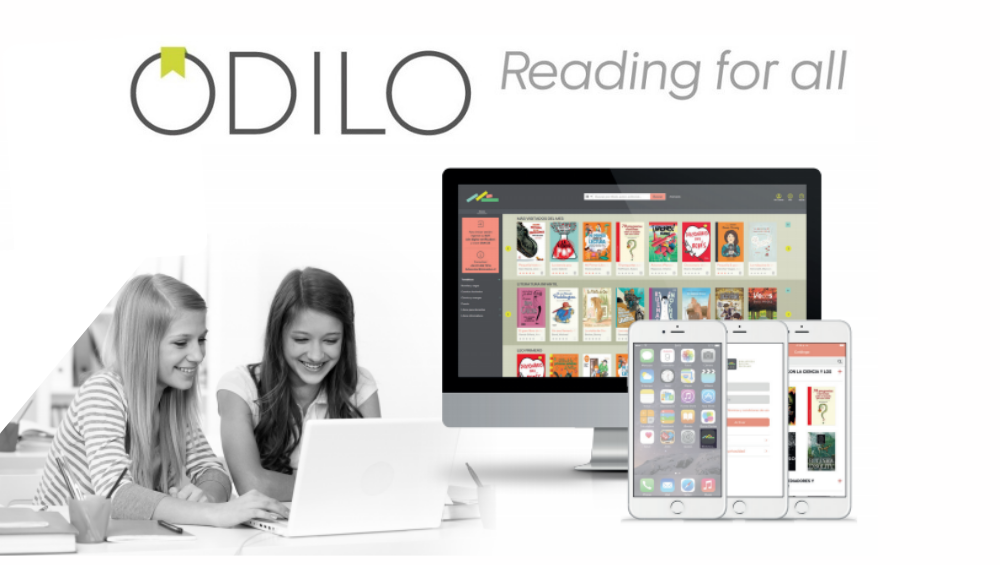Categories:
– Talking books and reading solution that orientates the eyes: the ODILO Accessibility Module empowers readers with learning and vision difficulties
– ODILO’s First Inclusive Book Club has been launched in Chile
At ODILO, we are committed to equal opportunities for all people. Therefore, we work to make our intelligent digital library more and more inclusive for all, especially for readers with special educational needs.
With this philosophy in mind, we have created the new ODILO accessibility module. Now, those who have learning difficulties or reduced visual abilities can have a learning experience suited to their needs in order to fully exploit their potential.
With ODILO, each electronic textbook can be listened to and offer technology developed especially for easy reading for people with dyslexia or difficulties for reading and learning.
With this module, the ODILO intelligent digital library follows the Web Content Accessibility Guidelines.
These technologies can be used at any time, from anywhere and on all devices (available on web and app). In addition, the new features can be used both online and offline, which makes these technologies reach all corners of the planet, providing equal access to education.
From text to speech: now our books speak to you
ODILO offers a new functionality designed for people with vision problems and visual disabilities.
The WHO estimates that more than 1.3 billion people in the world suffer from some type of visual disability. At least 39 million suffer from blindness, a number that could triple by the year 2050, around the world.
Committed to accessibility, ODILO has incorporated technology that converts written text into audio, allowing you to listen to any content. This allows those who have some difficulty of sight to read without a problem, through a talking book that narrates the content.
By voice controls, the user can play, pause, stop, increase or reduce the speed of the audio and move on to the next content. In addition, it is possible to select the preferred language available to read the text (function with more than 25 languages). With this improvement of the platform, all books can be listened to, allowing people to read and consume content with different degrees of visual capacity.
Reading that orientates the eyes: technology focused on learning difficulties derived from dyslexia
Dyslexia represents the most common learning difficulty and one of the most misunderstood. It is estimated that 1 in 10 people in the world suffer from dyslexia. Some 700 million people worldwide, among which 15% are students.
Dyslexia is a difficulty, on the one hand, to learn to read fluently and understand the text well, and on the other, to write. If a child does not read and write correctly, it is very likely that this will have a negative impact on their reading comprehension and, in the future, on their analytical capacity.
ODILO wants to combat this problem and, with a single click, allows the reader to use special letter typologies specially designed for readers with learning difficulties and attention or concentration problems, such as dyslexia or ADHD.
Through thicker typefaces and with greater spacing, ODILO facilitates reading with an emphasis on words and manages the eyes, to provide a more effective and focused reading experience.
This is an effort of ODILO to give access to all people to digital content, regardless of their physical condition, so that ALL know the complete ODILO experience.
First Inclusive Book Club
The Digital Public Library of Chile, with the help of ODILO, inaugurated the First Inclusive Book Club, with our special accessibility module, with the aim of promoting digital reading for people with special abilities.
Through the Virtual Book Club, participants can listen to the book they are analyzing, they can read it with typographies designed to guide the eyes in people with dyslexia or attention difficulties. The club’s analysis activities are also oriented around inclusion, offering participants facilities such as forums and inclusive reading comprehension exercises, to read and better understand.
Thanks to this initiative, the Digital Public Library became the first Chilean public institution to have these tools in its digital library, which contributes in order to obtain the full social inclusion of all citizens, ensuring the enjoyment of their rights and eliminating any form of discrimination based on disability.
Accessibility for ALL
Access to education, culture, and information is a universal right for all people, without distinction. This right is based on the principles of non-discrimination, equal opportunities and accessibility to information, established in the Universal Declaration of Human Rights.
In ODILO we work for a more just and egalitarian world where universal literacy exists. We align ourselves with the objectives of the 2030 Agenda for Sustainable Development of the United Nations.
According to the United Nations, libraries exist to guarantee access to information and education and opportunities for all and play an essential role in the dissemination of knowledge and the promotion of literacy. However, the reality is very different: half of the world’s population lacks access to information online, and people with special needs due to visual deficiencies or learning difficulties have even more limited access.
Aware of this gap, in ODILO we create intelligent digital libraries that include our new accessibility module.
